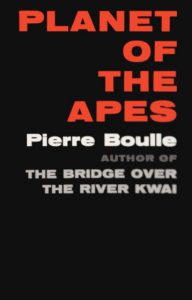This series celebrates 50 years of the “Planet of the Apes” film franchise. For this post, though, I’m taking a step further back and looking at Pierre Boulle’s 1963 novel.
Pierre Boulle’s 1963 novel “Planet of the Apes” is one of the classic “books that are better than the movie,” but it still gets lost in the shadow of the 1968 film. In my estimation, the French novelist (1912-1994) delivers one of the elite science fiction novels of the 20th century, using a foreign planet to explore Earthly biology, human nature, the primate evolutionary tree, the intelligent brain, classism, politics and the arc of civilization.
While Boulle’s book does have a twist at the end, it’s not precisely the same twist as the film. It’s a less surprising twist (if you’ve been paying attention), but it’s a richer one. The film doesn’t give the reason for humanity’s downfall, although Taylor (Charlton Heston) is so convinced that we blew ourselves up that it’s clear the filmmakers intend for that to be the Big Answer. Boulle – as a Frenchman, perhaps more exposed to ruling/servant class divide and the rise of socialism than other Western authors – tells us that human civilization simply stagnated, and apes took over.
This doesn’t sound dramatic, and it wouldn’t be on film, but it’s pleasurable to get these answers in book form via a human woman whose brain is essentially decoded by Cornelius and his fellow brilliant chimpanzees. Through her deeply stored genetic memories (I imagine they reside in the 90 percent of the brain that humans don’t use), we get tales of humans who cede their houses and other vestiges of civilization to their increasingly smart ape servants, and take to the forests – thus revealing what happened 10,000 years ago on Soror, an Earthlike planet in the Betelgeuse system. The foreshadowed twist comes when our hero Ulysse returns to Earth: Apes are now in charge there, as well. (And in the framing mechanism of a spacefaring couple reading Ulysse’s message in a bottle, it’s confirmed that those spacefarers are among the Earthly apes.)
A reader feels more intimate with Ulysse than a film viewer does with Taylor, because he is giving a first-person account. Boulle’s style is like Jules Verne’s, as Ulysse marvels at and worries over what he sees, but it’s more grounded. Specifically, the astronaut’s relationship to Nova is more intimate, and she is a character rather than a symbol, even though she can’t speak. The astronaut is frustrated by her animal nature, but drawn to her golden, perfect body and the fact that she seems to learn quicker than her cohorts. In the end, Ulysse has a baby with Nova, and the child is able to speak and learn like an Earth human, while helping his mother advance in intellect along with him.
The author was himself a prisoner of war, and we feel Ulysse’s helplessness when he is naked and caged. Weirdly though, Boulle’s novel feels less desperate than the movie. Our hero similarly has chimpanzees Zira and Cornelius as allies, but he is allowed to give a speech to the ape public – rather than just to the entrenched powers such as the orangutan Zaius — and he wins them over.

Boulle explains the political structure of the ape planet: Orangutans hold authority positions and are aggressively stuck in their ways. As the author writes on page 140 of the hardcover:
Endowed with good memory, they learn an enormous amount by heart and from books. Then they themselves write other books, in which they repeat what they have read, thereby earning the respect of their fellow orangutans.
Gorillas back powerful orangutans for the sake of their own power, while chimpanzees are the freest thinkers, holding jobs in fields such as science. Less savvy gorillas have the blue-collar jobs. As a whole, gorillas’ opinions follow popular opinion, so chimps actually do have power in that sense, and it’s why Ulysse is granted his liberty after his speech, and even gifted an apartment by the ape government.
Whereas the film gives the impression that apes simply took their turn when the playing field was ceded by self-destructive humans, Boulle isn’t actually arguing biological equality (or potential equality) between humans and apes. His fictional apes are devices for taking humanity to task, a way of saying “If we stagnate, a more primitive species will take our place.” Boulle paints a picture where ape society came about from early intelligent apes mimicking (or “aping”) their human masters. And that’s why Soror’s apes have advanced less in 10,000 years than Earth’s humans did in the same period. It also explains why apes are so cruelly hunting and experimenting on humans: That’s what humans did to them.
Boulle doesn’t definitively answer every question a reader might have. For example, what is it about human nature that triggers the “stagnation and surrender phase” that marks its fall from atop the food chain? Is he making an observation about his own society in 1960s France, or is he just a sci-fi imaginer who sees humans’ position as more tenuous than most assume? (The author’s lack of bluntness is to his credit, certainly, although I wouldn’t be surprised to learn he believed strongly in animal rights.)
It seems unlikely that Ulysse’s fellow traveler, a professor, would descend to his animal nature so quickly; I kept expecting a revelation that he was lobotomized, as with Taylor’s companion in the film. There’s also the issue that Earth humans have never used apes as servants, although we have of course experimented on them and hunted them. (However, the book – unlike the film – is set in the far future.)
But it does delve into biological and psychological theories more than the movie does, it puts a reader in the position of an animal treated cruelly by humanity, and it is ultimately a completely satisfying read.

